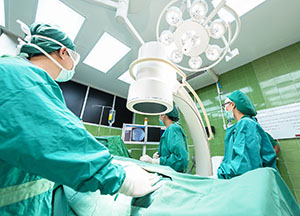Minister of Higher Education and President of Mansoura University inaugurate the Liver Transplant Center at Mansoura University
- Hits: 851

Minister of Higher Education:
-The new Liver Transplant Center is a national project with presidential directives and partnership with the Central Bank of Egypt
-The Liver Transplant Center at Mansoura University is the largest medical center in the Middle East and Africa at a cost of one billion pounds
-The new Liver Transplant Center reflects health development in the new republic and aims to eliminate waiting lists
-The Liver Transplant Center at Mansoura University is a medical edifice supported by the political leadership to meet the needs of patients
-University hospitals continue to develop, thanks to the support of the political leadership to provide distinguished health services
-The opening of the Liver Transplant Building enhances the role of university hospitals in education, training and supporting citizens' health
Prof. Ayman Ashour, Minister of Higher Education and Scientific Research, and Prof. Cherif Khater, President of Mansoura University, inaugurated the Liver Transplant Center at Mansoura University on December, 26, 2024. During the opening events, the Minister confirmed that the new Liver Transplant Building is a national project implemented with presidential directives and in strategic partnership with the Central Bank of Egypt, as the largest specialized center of its kind in the Middle East and Africa, at a total cost of nearly one billion pounds; In order to accommodate the increasing numbers of patients and eliminate waiting lists for liver transplantation at Mansoura University, noting that the center is a medical edifice supported by the President of the Republic, and reflects the health development in the new republic, stressing that Mansoura University is the capital of medicine in Egypt and the Arab world. He added that the opening of the liver transplant building comes within the framework of the ministry's interest in developing medical and health services in university hospitals, which are one of the main pillars in providing health services to citizens, in addition to the Ministry of Health hospitals, pointing to the important role played by these hospitals in education and training, and the unprecedented development they are witnessing thanks to the unlimited support of the political leadership, stressing that these hospitals enjoy the trust of citizens; Due to the distinguished health services they provide, praising the development work witnessed by Mansoura University, which contributes to providing the best medical services to citizens, stressing the important role of the university thanks to its distinguished cadres in all specializations, especially in the medical and therapeutic sectors.
The Minister praised the distinguished achievements of the Liver Transplant Program at Mansoura University, as 1,150 liver transplants have been performed since the program was established in May 2004, stressing that the program has become competitive with global centers in the same field, pointing out that the Ministry's vision for the health sector goes beyond providing treatment services to enhancing prevention and scientific research, developing human resources, and providing a sustainable health environment, noting that the Liver Transplant Center, which is managed by a team of the most skilled doctors and specialists, is a step towards achieving an integrated health system that befits the aspirations of Egyptians, directing thanks to everyone who contributed to the completion of this project from work teams and local and international partners.
Prof. Cherif Khater thanked the political leadership for adopting the Liver Center project; Due to its national importance in providing a specialized quality medical service in liver transplantation locally, regionally and internationally, stressing that the center is the culmination of the efforts of the liver transplant team over more than 20 years of experience, explaining that this center is the first in Egypt and the Middle East as an independent center with integrated services, pointing out that the liver transplant program at the university began in 2004 in its first phase in cooperation with several parties, then moved to the second phase in 2008, achieving great success in performing more than 1,150 transplant operations. He added that Mansoura University was keen on the continuity of the liver transplant project, as the number of cases in 2017 reached 500 cases, and in 2023 to 1000 cases, and currently the number exceeds 1150 liver transplant cases, including 110 cases for citizens of Arab and African countries, and 50 cases for children, noting that in 2016, with the confidence of civil society in the work team at Mansoura University, the concrete structure of the project was established at a value of nearly 20 million pounds, and since the political leadership kindly adopted the project in 2021, the project has been completed as desired, praising the prominent role of the Central Bank of Egypt in supporting the project as a strategic partner in it, in addition to what the Ministry of Planning and Economic Development provided, and the role of the Egyptian Authority for Unified Procurement, Supply and Medical Supply in providing the project's medical needs. He pointed out the role of the university's medical sector in providing specialized medical services to the Delta governorates and all over Egypt, serving an annual frequency of about two million patients through 13 hospitals and medical centers, stressing the university's keenness to provide modern infrastructure and train medical personnel; which contributes to developing health services in accordance with the objectives of the National Strategy for Higher Education and supporting the state's strategic plan to develop the health sector.
The liver transplant building was built on an area of 650 square meters, consisting of a ground floor, two extensions, in addition to 9 floors and service rooms. The building includes (3 operating rooms, 14 intensive care beds, 5 recovery beds, and 56 beds for patient accommodation). The ground floor (service floor) contains (main entrance, heat exchanger room, switch gear room, transformer room, generator room, UPS room, electrical panels room, medical gas room, and unclean waste room). As for the extension designated for regular x-rays, it includes (cafeteria, regular x-ray department, men's and women's changing room, and visual visit room).
The first upper floor designated for outpatient clinics and the x-ray department includes (CT scan room, MRI room, 7 medical clinics, sample collection room, 2 television x-ray rooms, pharmacy, archive, patient reception department, in addition to 3 medical stores).
The second upper floor "operations" includes (3 operating rooms, a recovery room, two changing rooms for men and women, a clean corridor, an unclean corridor, a waste room).
The third upper floor "electromechanics and doctors' lounge" contains (electromechanics space, 3 doctors' lounges, a doctors' lounge, a nurses' room, a waste room), and the fourth upper floor "intensive care" contains (an isolation room, a care ward with 4 beds, care services rooms, a doctors' room, a nurses' room, and changing and cleaning rooms, and waste).
The fifth upper floor "administrative" includes (a meeting room, a library, a medical archive, two classrooms, 6 doctors' offices, a cleaning room, an office).
The sixth upper floor "patients' rooms" contains (an isolation room, 13 patient rooms, 3 medical equipment rooms, a cleaning room, a store, a waste room, an office).
The seventh upper floor "patients' rooms" contains (an isolation room, 13 patient rooms, 3 medical equipment rooms, a cleaning room, a store, a waste room, an office).
The eighth upper floor "patients' rooms" contains (7 patient accommodation suites, 3 medical equipment rooms, a cleaning room, a store, a waste room, an office).
The ninth upper floor "laboratories, endoscopy and operations" contains (a cafeteria, 4 medical laboratories, an endoscopy room, an operating room, a store, a waste room, a doctor's room, a waste room).
The roof designated for sterilization and the workshop contains (a workshop, central sterilization, a laundry, a shield pump room, offices, changing rooms).
Major General Dr. Bahaa El-Din Zidane, Head of the Egyptian Authority for Unified Procurement, expressed his pleasure to be at the Liver Center, which is a medical fortress that contributes to serving the Delta governorates and all of Egypt, noting that this center is a wonderful model of cooperation between all government institutions in cooperation with civil society, pointing to the continuous follow-up of the project by the political leadership until its completion, and the Authority's keenness to support the project with the best medical devices with international specifications.
Dr. Omar Sharif Omar, Secretary of the Supreme Council of University Hospitals, pointed to the importance of the Liver Transplant Center at Mansoura University, stressing its vital role in eliminating waiting lists for patients with liver failure, liver cirrhosis, and primary liver tumors from Egyptian patients in all governorates, explaining that five liver transplants are performed weekly, instead of two operations in the current situation, which is an unprecedented number worldwide in liver transplant centers that rely on living donors from relatives, and he also pointed to accommodating a larger number of patients from Arab countries.
Dr. Ahmed Anani, the Minister's Advisor for Health Policies, pointed out the pivotal role of the Liver Transplant Center in training medical personnel on liver transplant techniques in Egypt, Arab and African countries, in addition to providing health services to the people of Dakahlia Governorate and neighboring governorates, appreciating the efforts of Mansoura University in providing the latest technical needs and training on developments that contribute to developing the skills of medical personnel and improving health services.
Prof. Ayman Ashour and Prof. Cherif Khater honored all those who participated in the Liver Center project in appreciation of their efforts. On the other hand, Dr. Ayman Ashour inspected the Cardiothoracic and Vascular Surgery Center at Mansoura University; To observe the level of medical services and equipment available, he praised the role of the center in providing distinguished health care, and the high level of performance of the work team.
Dr. Adel Abdel Ghaffar, the media advisor and official spokesperson for the ministry, stated that university hospitals are witnessing significant development in infrastructure, as continuous expansions are being carried out, the efficiency of buildings is being raised, attention is being paid to modern medical equipment, and the capabilities of human elements are being supported and developed; To improve the level of medical and therapeutic services provided to citizens, noting that the number of university hospitals is 125 hospitals, and they receive about 25 million patients annually, explaining that the development comes within the framework of implementing the directives of the political leadership to improve the level of medical and therapeutic services provided to citizens, in line with achieving the goals of the National Strategy for Higher Education and Scientific Research and Egypt's Vision 2030.
The opening ceremony was attended by Prof. Sayed Abdel Khalek, former Minister of Higher Education and Scientific Research, Prof. Al-Hilali Al-Sherbiny, former Minister of Education and Technical Education, Prof. Omar Sharif Omar, Secretary of the Supreme Council of University Hospitals, Prof. Ahmed Anani, Minister's Advisor for Health Policies, Major General Doctor Bahaa El-Din Zidan, Head of the Egyptian Authority for Unified Procurement, Prof. Ashraf Shoma, Dean of the Faculty of Medicine, Prof. Al-Shaarawy Kamal, Executive Director General of Hospitals and Medical Centers at the University, Prof. Helmy Ezzat, Director of the Gastrointestinal Surgery Center, and Prof. Mohamed Abdel Wahab, Professor of Liver Surgery and Transplantation at Mansoura Faculty of Medicine, President of the International Organization for Surgery, Gastrointestinal System and Oncology, Head of the Transplant Team, Ms. Ghada Tawfik, Advisor to the Governor of the Central Bank, a number of leaders of the Ministry of Higher Education and the University, the Vice Presidents of the University, Deans of Faculties, Directors of Hospitals at the University, representatives of the regulatory and sovereign authorities, and executive and popular leaders in Dakahlia Governorate.








